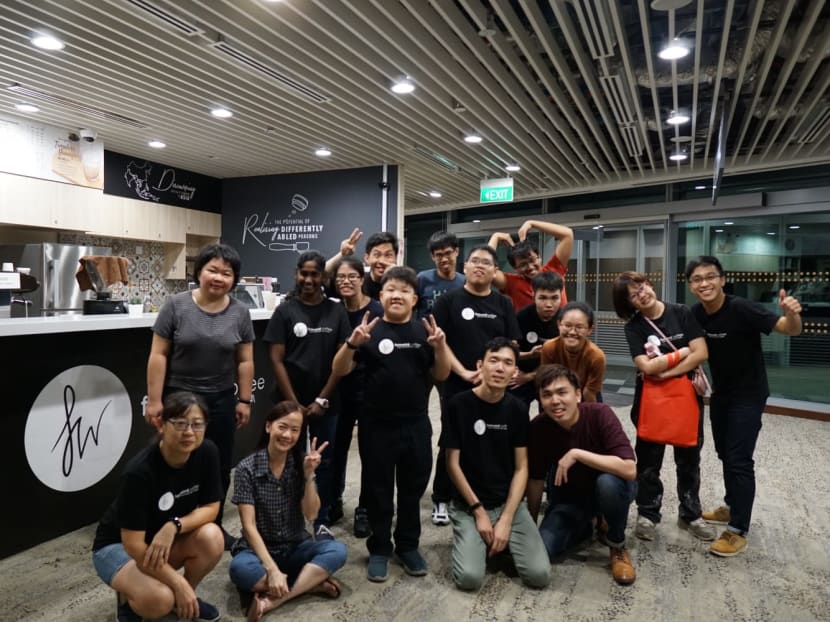Gen Y Speaks: Working with a team of differently abled persons can be rewarding
Foreword Coffee was started with a firm belief in the potential of differently abled persons. We use the term “differently abled” to recognise the strengths and abilities of those with special needs and disabilities.
I was in my final year studying psychology as a major in the National University of Singapore (NUS) when I started Foreword Coffee in 2017.
Prior to starting up this business, my internship experiences with social enterprises in Singapore and going through the NUS Overseas Colleges programme gave me a good exposure to the world of entrepreneurship.
The special needs cause is close to my heart because of personal experiences through volunteering and interactions with friends’ siblings.
Friends who have done internships with special education schools also shared that those who graduate upon turning 21 years old usually face challenges in society with regards to employment.
Foreword Coffee was started with a firm belief in the potential of differently abled persons.
We use the term “differently abled” to recognise the strengths and abilities of those with special needs and disabilities.
The company has grown from five staff members when we first started to our current team of 16 people. Of these, 11 of us have some kind of autism, cerebral palsy, or deafness and they help operate two cafes, with a third one coming soon.
Working with a differently abled team is similar to working with a team of “able-bodied” persons. At the same time, there is little to no politics in the company because any negative (and positive) emotions are openly shared among the team.
This makes emotional management one of the challenges to deal with in the company on a daily basis.
READ ALSO:
When organisations representing people with disabilities in Singapore are not inclusive
One of our staff with autism, Carol, is good at her cashiering and provides great customer service when she is in a good mood.
She takes effort to know our regular customers and their usual orders. Her friendly demeanour helps to brighten up the day of customers and colleagues.
Carol, however, receives stares on her way to work on the public transport if she is not conscious of her mannerisms. She might speak loudly to herself on the MRT, and then feel upset when people stare at her.
During such days, she tends to ask “why don’t people like me?” and may turn up for work not in the right frame of mind.
On such days, we try to help her rationalise and manage her emotions and calm her down before she takes orders from customers.
As we deal with her negative emotions, we need to also be aware of the emotions that build up within us. It is difficult at times because of her incessant “why” questions which we may not be able to answer.
READ ALSO:
Reaching out to persons with invisible special needs, with the help of a label
At our cafes, we have deaf managers who take charge of operations and care for the needs of the rest of the team.
So I often get asked: “How do your deaf managers communicate with the rest?”
Our menu is designed to be simple so that we can simply sign the orders across the café.
“Black” and “white” are used to communicate your usual “Americano” and “latte” respectively.
Our managers are more than happy to teach us sign language informally at the cafes during quiet times so that we can communicate with them.
Over time, the team has become more fluent in sign language. Otherwise, we can always fall back on pen and paper for communication.
We have had feedback from some customers that we should put up more prominent signs at our cashier to say that we are hiring persons with disabilities.
Some customers share they feel annoyed when the cashier cannot understand their order, only for them to later feel shocked, ashamed, and then guilty, when they realise that the cashier is deaf.
Putting up a sign is easy, but my business partner and I decided against it as a way to advocate for persons without disabilities to step into the world of persons with disabilities.
For the most part of their lives, persons with disabilities have been trying to fit in and overcome barriers so that society accepts them.
Just for once, we can learn to be more aware of those with disabilities around us, and we create such opportunities for interactions at our cafés.
Through my interactions with my differently abled team, I have learnt to not place limits on the differently abled.
Once, my deaf manager asked if I have reservations placing her at the cashier position. I had thought that she would not be comfortable interacting with customers directly.
As it turns out, she is okay with doing so because she has had years of experience in the F&B line.
She is confident of telling customers that she is deaf and to order through pointing at our menu.
Another staff member who has autism at first refused to learn to use the steam wand on the espresso machine as he was afraid of being scalded.
After several months, he overcame his fear and could also draw simple latte hearts in the coffee that he serves.
I enjoy working with my differently abled team despite the difficulties faced. This journey is rewarding because I learn new things every day.
I learn that persons with disabilities are very much the same as the abled-bodied, with their fears, hopes, and aspirations.
They also have potential to be realised, only if we give them the opportunities to do so.
ABOUT THE AUTHOR:
Lim Wei Jie, 27, is founder of Foreword Coffee.










